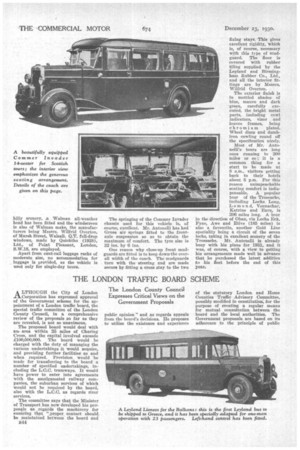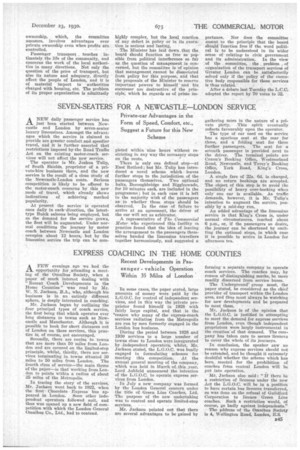THE LONDON TRAFFIC BOARD SCHEME
Page 58

Page 59

If you've noticed an error in this article please click here to report it so we can fix it.
The London County Council Expresses Critical Views on the Government Proposals ALTFIOTJGH the City of London Corporation has expressed approval of the Government scheme for the appointment of a London traffic board, the special traffic committee of the London County Council, in a comprehensive review of the proposals so far as they are revealed, is not so unanimous.
The proposed board• would deal with are area within 25 miles of Charing Cross, and the capital involved exceeds £100,000,000. The board would be charged with the duty of managing the various undertakings it would acquire, and providing further facilities as and when required. Provision would be made for transferring to the board a number of specified undertakings, including the L.C.C. tramways. It would have power to enter into agreements with the amalgamated railway companies, the suburban services of which would not be required by the board, also with the L.C.C, as regards river services.
The committee says that the Minister of Transport has now developed his proposals as . regards the machinery for ensuring that ",proper contact should be maintained between the board and
of the statutory London and Home Counties Traffic Advisory Committee, possibly modified in constitution, for the purpose of creating a regular means for mutual consultation between the board and the local authorities. The Government proposals are based on its adherence to the principle of public ownership, which, the committee assumes, involves advantages over private ownership even when profits are controlled.
Passenger transport touches intimately the life of the community, and concerns the work of the local authorities in many directions. Not only the question of the price of transport, but also its nature and adequacy, directly affect the people of London, and it is of material import to authorities charged with housing, etc. The problem of its proper organization is admittedly highly complex, but the local reaction of any defect in policy or in its execution is serious and lasting.
The Minister has laid do wn.that the board should function as free as P4sibk from political interference so far as the question of management is concerned, but the committee is of opinion that management cannot be dissociated from policy for this purpose, and that the proposals of the Minister to reserve important powers to himself and his successor are destructive of the principle, which he regards as of prime im
portance. Nor does the committee assent to the principle that the board ' should function free if the word political is to be understood in its wider sense of relating to civic government and its administration. In the view of the committee, the problem , of organization of the transport services of Greater London can be .satisfactorily solved only if the policy of the' executive body responsible for these services is thtts related. .
After a debate last Tuesday the L.C.C. adopted the report by 70 votes to 32.




























































































